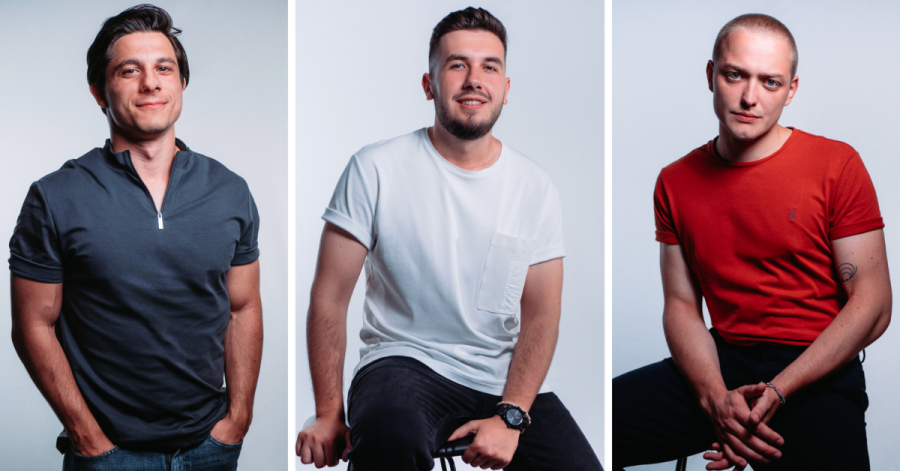For startups, pivots can be a double-edged sword—risky but often necessary when the original business model fails to deliver. That was the case for the team behind Unfrosen, a B2B marketplace for surplus fashion inventory. Initially launched as The Outfit, in 2020, a platform offering a unique approach to online apparel shopping, the founders realized by late 2022 that their venture wasn’t scaling as expected.
Rather than continue on an unsustainable path, the co-founders—Ciprian Dudulea, Horia Stupu, and Serban Buliga—made the decision to pivot. What followed was an eventful transformation, culminating in Unfrosen’s successful launch and rapid growth across Europe.
“At the end of 2022, we hit a hard reality check: The Outfit wasn’t scaling the way we’d hoped,” recalls Ciprian Dudulea, CEO and co-founder of Unfrosen. “Rather than burning through our remaining runway, we chose to pivot quickly and transparently.”
The decision wasn’t easy. Dudulea and his co-founders had to get on board their 35-person staff and the investors from their €1M seed round, which included TSG Capital, angel investors like Sergiu Negut of FintechOS, Ilinca Paun of Bravva, and the crowdinvesting platform SeedBlink.
“We had to sit down with everyone and say, <We’ve learned a ton, but we need to change course>,” Dudulea explains.
While the process was challenging, their honesty earned them support. “Our investors appreciated that we owned up to the situation and didn’t drag it out. By ripping off the band-aid, we were able to re-group and channel our resources into something with far bigger potential.”
That decision laid the groundwork for Unfrosen’s growth, with the company generating a €1.2M turnover in its first nine months since official launch.
The idea behind Unfrosen
The idea for Unfrosen emerged from the team’s experience with inventory challenges at The Outfit. Serban Buliga, one of the three co-founders recalls, “We struggled to offload unsold stock, and we realized it wasn’t just our problem—countless retailers and brands face the same issue.”
This realization showed a bigger problem in the market. Fashion brands often struggle to liquidate excess inventory, while independent retailers face difficulty sourcing quality merchandise at affordable prices. The secondary market for fashion inventory was dominated by informal, opaque channels that lacked trust and transparency.
“We saw an opportunity to create a private B2B marketplace where verified members could transact securely and efficiently,” Buliga says. The platform they developed matches surplus inventory from approximately 50 suppliers (brands and retailers) with a network of +3,000 buyers (independent stores) across Europe, handling everything from logistics to payments.
“Brands and retailers can quickly monetize excess stock, while independent buyers gain reliable access to in-demand products at excellent margins. It’s a win-win that addresses both sides of the market,” co-founder Horia Stupu explains.
How the business model works
Unfrosen operates on a commission-based revenue model, earning fees for successful transactions facilitated through the platform. The company differentiates itself by offering a fully integrated service that includes logistics, billing, payment terms, and customer support.
For sellers, Unfrosen provides a streamlined solution to liquidate unsold stock discreetly and efficiently. By maintaining seller anonymity, the platform helps protect brand reputation and minimize channel conflict.
Buyers—who include physical boutiques, online retailers, and TikTok live-shopping resellers—benefit from access to high-quality merchandise at significant discounts. – conditions previously found only in fragmented “grey markets”.
Rapid expansion and milestones
Since its launch, Unfrosen has expanded into nine European countries, including Romania, Bulgaria, Hungary, Greece, Poland, and Latvia. The company’s lean team of nine employees has driven big results: a 330% year-over-year increase in turnover is projected for 2024, rising from €1.2M in 2023 to an anticipated €4M.
“This rapid growth reflects the strong demand for what we’re offering. We’ve built a product that both sides of the market need—it’s efficient, transparent, and scalable,” says Unfrosen’s CEO.
Unfrosen competes in a niche traditionally served by fragmented wholesale channels and informal brokers using messaging apps. The platform’s key differentiators include strict membership vetting, end-to-end logistics, and robust confidentiality for users.
“Anonymity is key in our business. Many brands want to keep sales channels discreet when liquidating excess stock to preserve brand image and avoid channel conflict, while independent shops prefer to keep their sourcing strategies private. We provide a neutral platform that respects these needs while delivering value to all parties,” Dudulea explains.
What’s next for Unfrosen
Looking ahead, the company is focused on expanding its service offerings to meet growing customer demand. By 2025, Unfrosen plans to introduce tools enabling buyers to digitize their entire supply chain through the platform, from order placement to in-store delivery.
For sellers, the company is developing an automated recovery rate estimation tool, leveraging transaction data to forecast potential earnings from surplus stock.
As Unfrosen scales, the company is committed to sustainable growth. It expects to achieve positive EBITDA by the end of 2024, prioritizing operational efficiency and value delivery over rapid cash burns.
“Our primary focus is sustainable growth, operational excellence, and delivering value to our network of partners. While we are continually evaluating our financial strategy to support expansion, product innovation, and technology investments, we have not yet decided on raising a new funding round,” he says.








